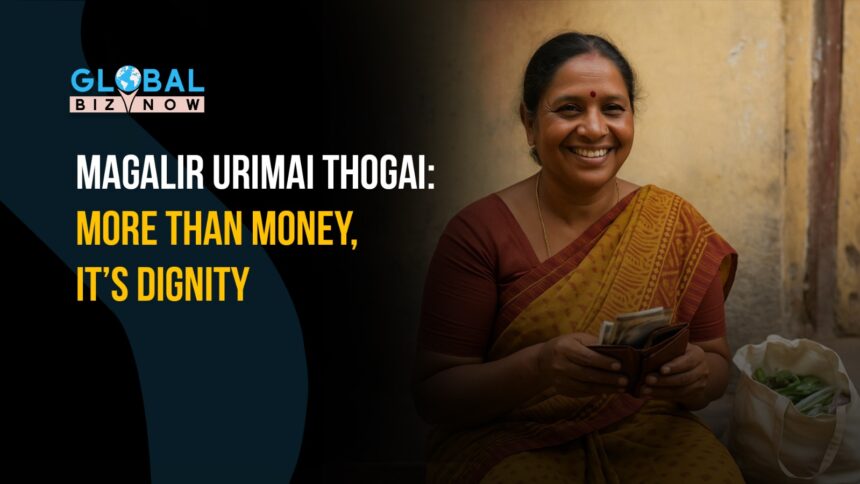In a modest household in Chennai, a woman once struggled for the simplest of needs. To visit her ageing parents in Salem, she would plead with her husband for bus fare. The answer was almost always the same: there wasn’t enough money. Medicines for her parents or even a basket of fruits remained unaffordable luxuries.
Today, her story is different. With a monthly transfer of ₹1,000 directly into her bank account, she travels on her own terms. She buys groceries, pays for medicines, and returns with pride instead of guilt. For her, this modest sum has become a symbol of independence and dignity.
This transformation has been made possible by Tamil Nadu’s Kalaignar Magalir Urimai Thogai scheme — one of India’s most ambitious direct benefit programs dedicated exclusively to women.
More Than a Welfare Transfer
Launched to put money directly in the hands of women, the scheme has redefined how social support is viewed. It is not branded as an allowance or subsidy. Instead, it is called Magalir Urimai Thogai — the Women’s Rights Grant. The very name shifts the narrative: from welfare to recognition, from charity to justice.
For beneficiaries, the impact is both economic and emotional. Even a modest independent income allows women to make household decisions without waiting for approval. Whether it is buying a saree, paying for school notebooks, or visiting parents, the psychological effect of financial autonomy is transformative.
Critics and Counterpoints
Like most welfare programs, the initiative faces criticism. Detractors argue that the money could be misused or diverted by male family members. Others dismiss it as a populist freebie with no long-term effect.
However, studies and ground evidence suggest otherwise. The majority of funds are spent on essentials such as food, healthcare, and education. Ignoring women’s financial management skills overlooks decades of proof that women are the most responsible stewards of limited household resources.
The Economic Ripple Effect
The benefits of direct income support to women extend beyond households. Global research shows that when women control finances, spending naturally prioritises nutrition, education, and healthcare — leading to intergenerational progress.
Tamil Nadu reflects this pattern. The sight of women confidently queuing at ATMs and banks has become a social signal of inclusion. Financial empowerment at the grassroots is no longer an abstract idea but a lived reality.
From Political Mockery to Policy Copycats
When first announced, opposition parties mocked the scheme as unsustainable populism. Yet today, states like Karnataka, Delhi, and Maharashtra have adopted similar programs. The “copycat effect” proves that direct transfers to women are not only politically attractive but socially transformative.
What began in Tamil Nadu is now reshaping the national welfare discourse.
Challenges That Remain
No policy is flawless. Documentation requirements exclude some deserving groups such as widows and transgender persons. Moreover, ₹1,000 per month, while helpful, cannot solve larger structural issues like women’s low workforce participation or lack of opportunities.
These challenges, however, call for refinement, not rejection. With better targeting, digital support systems, and financial literacy programs, the scheme’s impact can only grow.
A Correction of History
At its heart, Magalir Urimai Thogai is more than a fiscal initiative. It is an acknowledgment of unpaid labour that women have contributed for centuries. By framing it as a “right,” the Tamil Nadu government has elevated the conversation — recognising women’s contribution to both families and the economy.
Looking Ahead
As India prepares for its centenary of independence in 2047, a crucial question arises: can the nation call itself developed without truly valuing women’s labour? Tamil Nadu’s scheme offers a blueprint.
Every ₹1,000 transfer carries more than monetary worth. It brings dignity, independence, and recognition. For many women, it marks the difference between dependence and decision-making, invisibility and empowerment.
One beneficiary said it best: “For the first time, I didn’t have to beg.”
That single sentence explains why Magalir Urimai Thogai is not just a welfare policy — it is progress and empowerment. GBN


















